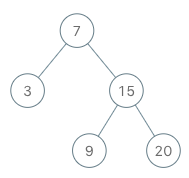Implement an iterator over a binary search tree (BST). Your iterator will be initialized with the root node of a BST.
Calling next() will return the next smallest number in the BST.
Example:
BSTIterator iterator = new BSTIterator(root); iterator.next(); // return 3 iterator.next(); // return 7 iterator.hasNext(); // return true iterator.next(); // return 9 iterator.hasNext(); // return true iterator.next(); // return 15 iterator.hasNext(); // return true iterator.next(); // return 20 iterator.hasNext(); // return false
Note:
next()andhasNext()should run in average O(1) time and uses O(h) memory, where h is the height of the tree.- You may assume that
next()call will always be valid, that is, there will be at least a next smallest number in the BST whennext()is called.
Companies:
Facebook, Amazon, Microsoft, Oracle, Bloomberg, Qualtrics, Cloudera, Uber, Google, LinkedIn, Cisco
Related Topics:
Stack, Tree, Design
Similar Questions:
- Binary Tree Inorder Traversal (Medium)
- Flatten 2D Vector (Medium)
- Zigzag Iterator (Medium)
- Peeking Iterator (Medium)
- Inorder Successor in BST (Medium)
// OJ: https://leetcode.com/problems/binary-search-tree-iterator/
// Author: github.com/lzl124631x
// Time: O(1) amortized
// Space: O(H)
class BSTIterator {
private:
stack<TreeNode*> s;
void pushNodes(TreeNode *node) {
while (node) {
s.push(node);
node = node->left;
}
}
public:
BSTIterator(TreeNode* root) {
pushNodes(root);
}
int next() {
auto node = s.top();
s.pop();
pushNodes(node->right);
return node->val;
}
bool hasNext() {
return s.size();
}
};